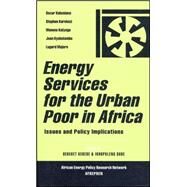Energy Services for the Urban Poor in Africa Issues and Policy Implications
, by Kebede, Bereket; Dube, Ikhupuleng- ISBN: 9781842775585 | 1842775588
- Cover: Hardcover
- Copyright: 11/27/2004
Studies of energy services for Africa's urban areas, and for the urban poor in particular, are still rare. The synoptic overview, supplemented by five detailed country case studies, contained in this volume are the result of path-breaking and innovative research on the African energy sector. Africa has experienced higher rates of urbanization than any other continent over the past generation, and today about one-third of the continent's population live in urban areas. But the supply of electricity to poor city dwellers has not kept pace: in 1970 some 40 million were without access to electricity; by the year 2000 this figure stood at over 100 million. The urban poor continue to rely on wood fuel, charcoal, kerosene and dung cakes for their energy needs, with all the environmental drawbacks that these sources involve. The only tangible policy response by most African governments has been to provide blanket energy subsidies in the form of kerosene and/or lifeline tariff subsidies. To address the challenges of meeting the energy needs of Africa's urban poor, the studies in this volume examine five main energy-related issues relevant to urban welfare, public finances, and the economy: To what extent poor urban households can afford modern energy sources without subsidies; The role of upfront fixed energy costs in affecting the affordability of modern energy by the urban poor; How well targeted energy subsidies are to the urban poor; The impact of these subsidies on the public finances; How electricity tariffs affect the operations of small and medium enterprises, which are the main source of livelihood for the majority of the urban poor who are not part of the formal sector of the economy. Book jacket.






